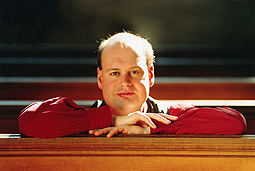Search
Anne L Ryan reports on Britten Sinfonia performing worksby Poulenc & Messiaen, Trinity College Chapel, Cambridge, 14 April 2007

Britten Sinfonia, orchestra
Polyphony, Choir of Trinity College, choirs
Susan Gritton, soprano
Stephen Layton, conductor
Programme:
Poulenc Quatre motets pour un temps de pénitence
Poulenc Exultate deo
Poulenc Salve Regina
Massaien Les offrandes oubliées
Poulenc Gloria
It was a pleasure to hear the latest Britten Sinfonia performance at Trinity College Chapel, Cambridge on Saturday, 14 April 2007. The Choir of Trinity College joined conductor Stephen Layton's choir Polyphony on this occasion. The opening note struck the rafters, swirling and lingering in the acoustics of Trinity Chapel. The combined vocal blend created a heavenly resonance. Poulenc's Quatre motets pour un temps de pénitence offers intense powerful drama, with delicate melodies laced with melancholia. Here these voices did not dwell; they stirred with vim and vigour, responding to their conductor with emotional panache, persistently moving the listener on. A most cherished moment was the honeyed voice of soprano Amy Howarth, who led us into heavenly bliss on Deus meus, ut quid me dereliquisti?
The motets were followed by two anthems Exultate Deo and Salve Regina. Different from the intensely dramatic Motets, they have a light, joyful quality. The choir excelled in the singing of Poulenc's unorthodox progressions, impulsive dissonances and blue notes in Exultate Deo, absorbing the listener without apology, at times pinning them to their seats. The Salve Regina was an entirely different anthem of celebration, allowing the voices to mould a new tonal resonance. Most noteworthy was Ad te suspiramus gementes et flentes which was intensely moving.
The Choir departed, making way for Britten Sinfonia and their performance of Olivier Messiaen's Les offrandes oubliées. In the first offering we were thrown and spun every which way, pursued by timpani. The second offering was much calmer. Light and fragile, it was performed with a mysterious sensuous delicacy by the strings. The long, languishing, lingering effect brought to mind thoughts of Debussy and images of Monet's lilies.
After a short break we were treated to the pièce de r ésistance, with choir and ensemble combining to perform Poulenc's Gloria in Excelsis Deo. Heralded by the brass, the choir joined in creating a most exquisite sound. The frivolous staccato on Laudamus te, was airily playful, with the tenors' brilliant chanting atonement bringing us to earth again on gratias agimus tibi. Susan Gritton's performance of Domine Deus, Rex caelestis... was deeply lonely and extraordinarily profound, an astonishing achievement for a soloist's opening line. Her response to the choir each time reminded all to colour judgment with humility. When the male voices took over on Qui sedes ad dexteram Patris, they delivered a powerful warning in full co-operation with the timpani, brass and woodwind. We were replete with Susan Gritton's final Amen which was sung with the most delicate poise and grace.
The programming of two contemporary composers, Poulenc and Massiaen, rarely heard together, could have fallen flat; but this well-measured risk was a success. It can be ascribed to Stephen Layton's direction: his outstanding flair and musicianship was complemented magnificently by Britten Sinfonia, Polyphony, and the Choir of Trinity College, Cambridge.
Writer: Anne L Ryan